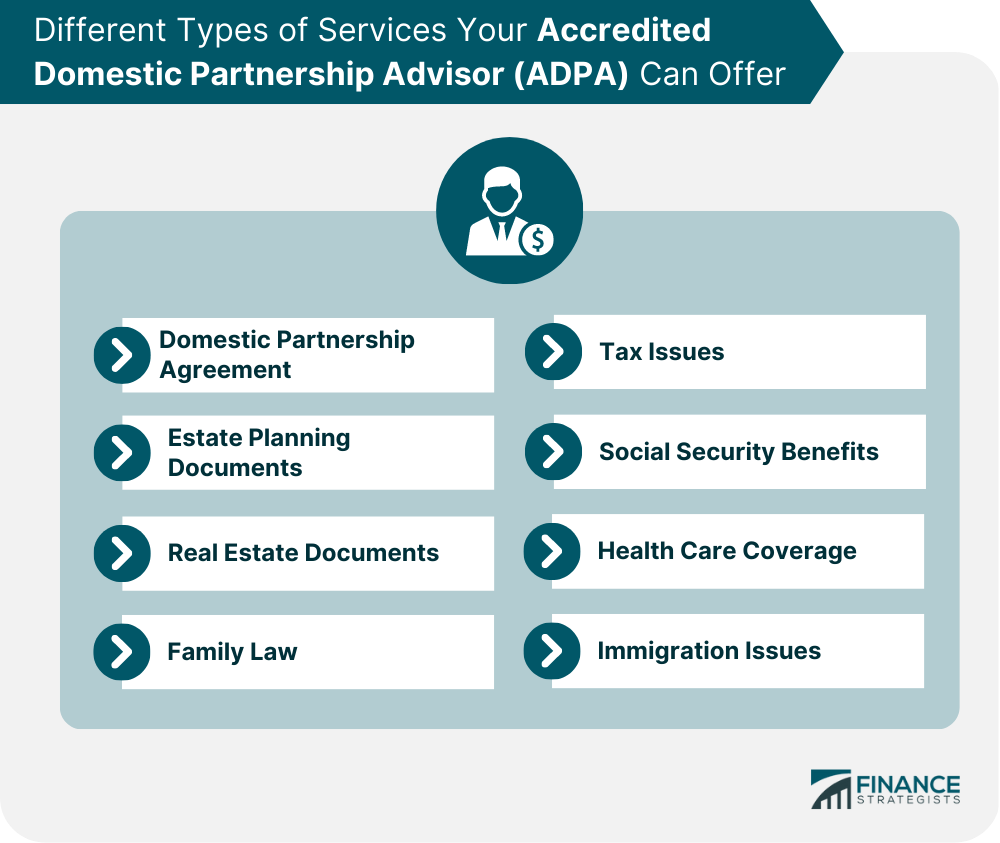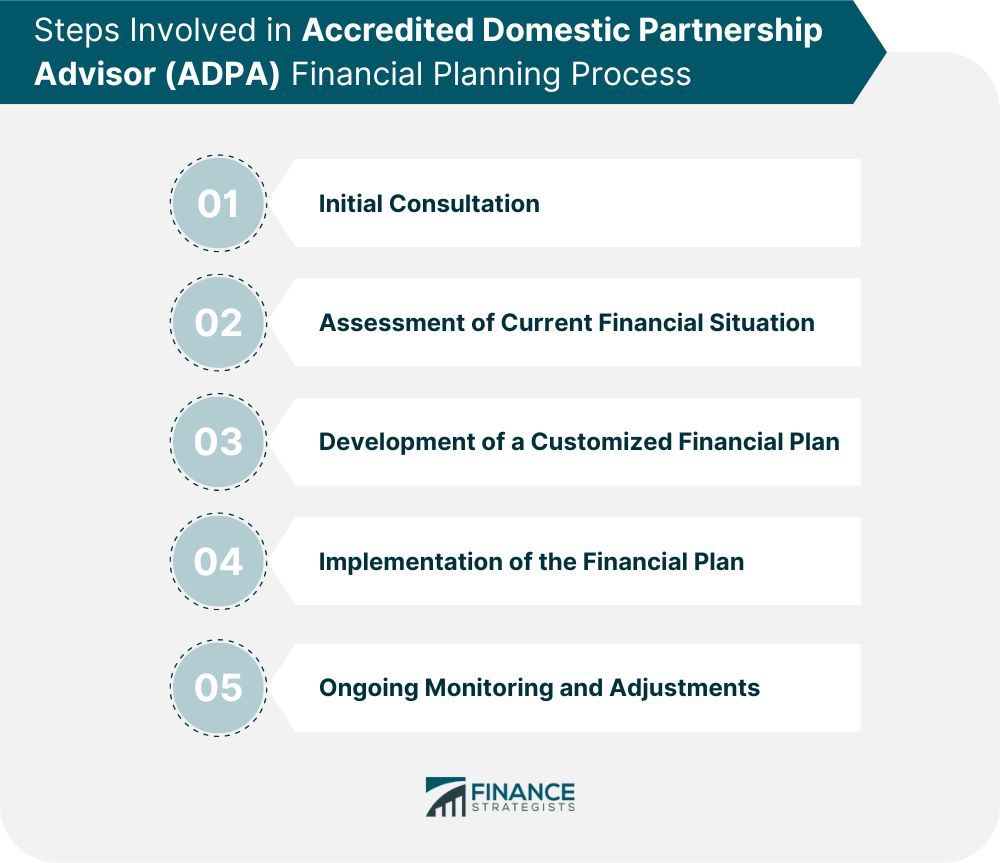An Accredited Domestic Partnership Advisor is a financial professional who specializes in working with domestic partners. ADPAs are trained to understand the unique financial challenges and legal considerations faced by domestic partners, and they can provide tailored financial planning advice to help couples achieve their financial goals. Have a financial question? Click here. To become an ADPA, a financial professional must complete a comprehensive training program that covers topics such as tax and estate planning, retirement planning, insurance, and investment strategies for domestic partners. In addition, ADPAs must adhere to a strict code of ethics and participate in ongoing continuing education to maintain their accreditation. An ADPA's role in financial planning for domestic partners is similar to that of any financial planner, with the added expertise of understanding the unique challenges and considerations faced by domestic partners. ADPAs work closely with their clients to create customized financial plans that address their specific goals and needs, taking into account factors such as income, expenses, assets, and liabilities. An ADPA can offer a range of services to help domestic partners navigate their financial landscape. A domestic partnership agreement can establish the rights and responsibilities of each partner in case the partnership is dissolved. This legal document can address issues such as property division, financial support, and custody arrangements for children. An ADPA can help domestic partners create a comprehensive estate plan that includes wills, trusts, and healthcare directives to ensure that each partner's wishes are respected in the event of their death or incapacity. They can also help with beneficiary designations for life insurance policies and retirement accounts. ADPAs can assist domestic partners with real estate concerns such as buying and selling property, commercial leases, co-ops, and condominiums. ADPAs who specialize in family law can represent domestic partners in adoption, divorce, prenuptial agreement disputes, child custody cases, child support issues, visitation rights, and spousal support. An ADPA can provide guidance on tax planning strategies that are specific to domestic partners, such as whether or not to file taxes jointly or separately, and can help with the preparation of tax returns. ADPAs can help domestic partners understand their social security benefits, such as eligibility for family leave, survivor benefits, and retirement benefits. ADPAs can help domestic partners navigate the complexities of healthcare coverage options, including ensuring that each partner is covered by employer-sponsored health insurance. ADPAs can provide guidance on immigration issues that may impact their financial situation, including issues related to visas, green cards, and citizenship for same-sex couples and interracial couples. The financial planning process for domestic partners typically involves several steps, including: Step 1: Initial Consultation. The ADPA will meet with the clients to discuss their financial goals and concerns, as well as any unique challenges they may face as domestic partners. Step 2: Assessment of Current Financial Situation. The ADPA will review the client's current financial situation, including their income, expenses, assets, and liabilities. Step 3: Development of a Customized Financial Plan. Based on the client's goals and financial situation, the ADPA will develop a customized financial plan that includes strategies for budgeting, investing, tax planning, and estate planning. Step 4: Implementation of the Financial Plan.The ADPA will work with the clients to implement the financial plan, which may involve opening new accounts, transferring assets, and making other financial decisions. Step 5: Ongoing Monitoring and Adjustments. The ADPA will monitor the clients' financial plan on an ongoing basis, making adjustments as necessary to ensure that the plan remains aligned with their goals and needs. An ADPA can provide expert advice and guidance on financial matters that are specific to domestic partners, such as tax implications of cohabitation, estate planning, and healthcare directives. Additionally, an ADPA can help ensure that both partners are on the same page when it comes to financial goals and can provide unbiased advice to help resolve any financial conflicts that may arise. An Accredited Domestic Partnership Advisor (ADPA) can provide expert financial guidance and advice to domestic partners, addressing the unique challenges and considerations that they face. Through a customized financial planning process, ADPAs can help domestic partners achieve their financial goals, such as creating comprehensive estate plans, navigating complex tax and legal issues, and maximizing their social security and health care benefits. By choosing to work with an ADPA, you can have peace of mind, knowing that you have a financial expert on your side who understands your unique situation and is committed to helping you achieve your goals. Definition of an Accredited Domestic Partnership Advisor (ADPA)
Qualifications Required to Become an ADPA
How Does an ADPA Work?
Different Types of Services ADPA Can Offer

Domestic Partnership Agreement
Estate Planning Documents
Real Estate Documents
Family Law
Tax Issues
Social Security Benefits
Health Care Coverage
Immigration Issues
Steps Involved in the ADPAs Financial Planning Process

Benefits of Hiring an ADPA
Final Thoughts
Accredited Domestic Partnership Advisor (ADPA) FAQs
An Accredited Domestic Partnership Advisor (ADPA) is a financial professional who specializes in working with domestic partners. ADPAs are trained to understand the unique financial challenges and legal considerations faced by domestic partners and can provide tailored financial planning advice to help couples achieve their financial goals.
Domestic partners face unique financial challenges and considerations that may not be addressed by traditional financial advisors. Hiring an ADPA can provide expert advice and guidance on financial matters specific to domestic partners, such as tax implications of cohabitation, estate planning, and healthcare directives.
ADPAs can offer a wide range of services, including drafting a domestic partnership agreement, creating estate planning documents, preparing real estate documents, offering guidance on family law issues, providing advice on tax issues specific to domestic partners, helping partners understand their social security benefits, navigating health care coverage options, and providing guidance on immigration issues.
There are several resources available for locating an ADPA, including the Financial Planning Association (FPA) website, the National Association of Personal Financial Advisors (NAPFA) website, and referrals from friends or family members who have worked with an ADPA in the past.
ADPAs can help domestic partners achieve their financial goals by providing expert advice and guidance on financial planning strategies that are tailored to their unique situations. This may include creating a comprehensive estate plan, offering guidance on tax planning strategies, helping partners navigate health care coverage options, and providing advice on retirement planning and investment strategies.
True Tamplin is a published author, public speaker, CEO of UpDigital, and founder of Finance Strategists.
True is a Certified Educator in Personal Finance (CEPF®), author of The Handy Financial Ratios Guide, a member of the Society for Advancing Business Editing and Writing, contributes to his financial education site, Finance Strategists, and has spoken to various financial communities such as the CFA Institute, as well as university students like his Alma mater, Biola University, where he received a bachelor of science in business and data analytics.
To learn more about True, visit his personal website or view his author profiles on Amazon, Nasdaq and Forbes.











